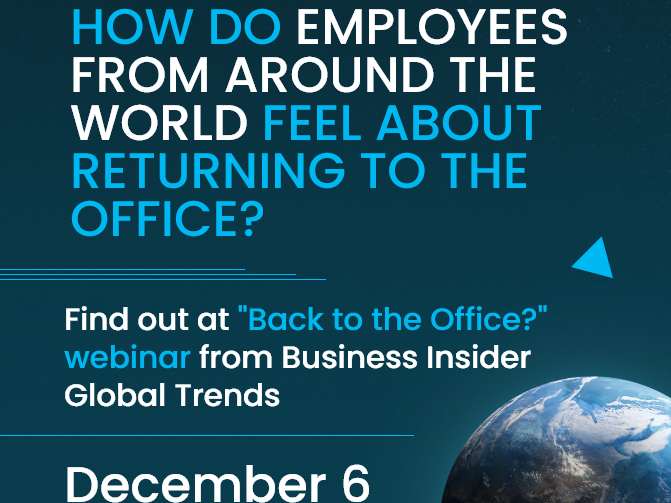
- Companies are officially offering their staff flexibility on their future work model.
- But as the largest US employers retain remote work as an option, they are pushing hard to revive the office as the center of corporate life again
- How do employees feel about this push back to the office? Are recent manifestos by activist employee groups at big tech giants a warning sign of possible wider backlash, discontent, and resignation?
- Sign up for our webinar on December 6 to learn the results of Business Insider's global survey and to hear lessons learned from the most progressive companies
Are employees frustrated or happy about returning to the office?
Should your employees return to the office for five or two days a week?
Who should decide on the times and days for returning to the office: the management boards, the teams, or the employees themselves?
Is the Great Resignation just a catchy media-coined phrase or a real threat to employers?
Learn the answers at the Business Insider Global Trends webinar on December 6. America's biggest expert on remote work, Stanford's Prof Nick Bloom, and a few executive insiders will comment on the results and share their firsthand experiences of what the world's most progressive companies do to balance their needs with those of their employees.
Manhattan office space is thriving again
From stock traders to big tech, the biggest US employers are determined to return to the office. The last few weeks have proved that the office is slowly becoming the center of corporate life again.
In New York City, Manhattan's one million office workers are a good illustration of the trend.
The Partnership for New York City, the nonprofit which represents more than 300 of the city's largest businesses, found in its survey that office attendance reached 27% at the end of October and is projected to climb to 49% by the end of January.
New York City employers expect that within just two months 57% of their personnel will work at the office at least three days a week while 21% remain fully remote.
Big tech companies are following suit. Google's CEO Sundar Pichai said in October that the tech giant's San Francisco Bay Area offices near its headquarters are already up to 30% full while New York offices are close to 50% full.
If real estate decisions are any indication of long-term intent, in late September Google spent USD 2.1 billion on a sprawling Manhattan office building on the Hudson River waterfront, paying the highest prices for an office building since the pandemic began, and one of the highest in US history, according to data company Real Capital Analytics.
When construction of the new office building ends in mid-2023, Google will have more than 3.1 million square feet, or 290,000 square meters of office space in New York, making it one of the largest leaseholders in the city.
Bonuses and phased implementation to persuade staff to return
Google, one of America's largest employers with 130,000 staff, is not leaving it to chance to fill its offices again. According to the anti-vaccination manifesto that 600 of the company's employees sent to their CEO in November, Joe Kava, vice president of data centers at Google, announced a USD 5,000 vaccination incentive spot bonus for US data center employees to persuade employees to get vaccinated, which is a prerequisite for entering an office.
Another big tech giant, Apple, with 80,000 staff on its payroll in the United States, also insists its staff should return to their offices. Despite considerable backlash from its employees, Apple CEO Tim Cook reminded staff in an email in mid-November that most corporate workers would be summoned back to their offices for Mondays, Tuesdays, and Thursdays as soon as the hybrid work plan is implemented.
One concession to Apple's original plan is that the three-day office work week starting in March will be preceded by one month of one or two office days per week in February. The other concession is that company personnel will be allowed to take up to four weeks of remote work a year, up from two weeks announced originally. The concessions will not change the overall balance between office work and remote work, just delay the office hegemony by one month.
Inclusivity standing in the way
Bonuses and phased implementations may not be enough to convince employees to return to the office. The big obstacle is that a growing proportion of staff, especially in tech companies, feel that the forced return to the office violates the principles of inclusivity that these companies so openly declared and cherished earlier.
For Apple workers, inclusivity comes with flexibility. In a June petition to Apple CEO Tim Cook, they wrote: "Without the inclusivity that flexibility brings, many of us feel we have to choose between either a combination of our families, our well-being, and being empowered to do our best work, or being a part of Apple."
They continued: "We ask for your support in enabling those who want to work remotely / in location-flexible ways to continue to do so, letting everyone figure out which work setup works best for them, their team, and their role — be it in one of our offices, from home, or a hybrid solution. We are living proof that there is no one-size-fits-all policy for people."
1,700 Apple employees signed the first petition in June. Another letter of protest came a month later.
A new petition on the same grounds of violating the principles of inclusivity came in November. This time Google employees asked their leaders to retract the company's COVID-19 vaccination mandate. The mandate follows the orders of President Biden's administration whereby all US employers with 100 or more workers have to ensure that all employees are fully vaccinated or regularly tested for COVID-19 by January 4.
Under the contested mandate, Google requires its employees to upload their vaccination status to the company's system and not enter the offices unless they are fully vaccinated against COVID-19.
According to NBC, the authors of the internal manifesto write that the mandate of "barring unvaccinated Googlers from the office publicly and possibly embarrassingly exposes a private choice as it would be difficult for the Googler not to reveal why they cannot return." They add: "Such Googlers may never feel comfortable expressing their true sentiments about a company health policy and other, unrelated sensitive topics. This results in silenced perspective and exacerbates the internal ideological 'echo chamber' which folks both inside and outside of Google have observed for years."
While the number of Google employees who have signed the manifesto is relatively small (600, 0.5% of the 130,000 staff), it is likely to grow as the return-to-work deadline of January 3 nears.
What do employees really want? Join our webinar to find out
Activist employee groups are small by design, as only a few employees are prepared to risk their work position for being outspoken about their needs. But these small groups may be a warning sign that something much bigger is taking place.
The Business Insider Global Trends team has decided to verify whether the petitions at tech giants are a sign of a broader discontent among rank and file employees which may undermine their future effectiveness at work.
As part of the online survey, we asked Business Insider users in six diverse markets, including the United States, Mexico, Spain, France, Poland, and South Africa, to share their opinions about remote work and returning to the office.
We asked our users whether they would prefer to work at the office or work from home, how many days a week they would rather spend at the office, who should decide on the times and days for returning to the office: the management boards, the teams, or the employees themselves.
The respondents shared with us whether they wanted to return, relocate or quit, and how concerned they were about their promotion prospects if they spent less time at the office than their peers.
We were also curious whether the respondents' companies have reduced or expanded their office space and whether they have used any stimulation, either positive or negative, to persuade their staff to return to the office.
What are the results of the survey? Find out by signing up for the Business Insider Global Trends webinar on December 6 (starting at 2 pm Eastern Time, or 8 pm CET). Entitled "Back to the office?", the event will feature America's biggest remote work expert, Stanford's Nick Bloom, and a few executives from the most progressive companies. They will comment on the survey results and present their firsthand experiences with implementing their new work models. Editors from four Business Insider sites will also discuss how local survey results differ from the global ones, and what the preferences of local office workers are.
To register for the 90-minute free webinar, click here.
